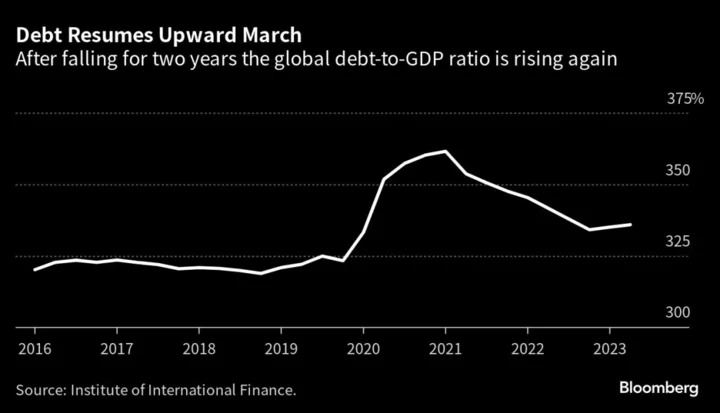Apollo Global Management Inc.’s James Zelter is “skeptical” of an economic soft landing. Ares Management LLC co-founder Michael Arougheti is concerned about the risk of a fiscal accident. Defaults will rise in coming years as riskier debt comes due for refinancing, according to Joshua Easterly of Sixth Street Partners LLC and hedge fund manager Hamza Lemssouguer.
Credit markets may be stable as the global economy proves resilient, but some of the titans of the debt world told the Bloomberg Global Credit Forum in London this week that they see looming headwinds as the impact of higher interest rates slowly filters through to consumers and companies.
The comments signal that money managers are still anxious about the impact higher rates will have on borrowing after the fastest interest rate increases in decades. Despite the speed of the central bank hikes, the amount of outstanding debt globally rose to a record $307 trillion in the first half of 2023, according to the Institute of International Finance.
Listen: Junk Debt Markets Are Hot Again; Real Estate Strife: Credit Edge
“The real impact of higher costs around the globe, in the US and western Europe, it’s not been felt yet. When people say we’re going to have a soft landing, I’m skeptical,” Zelter said in an interview with Tom Keene, Jonathan Ferro and Lisa Abramowicz of Bloomberg Surveillance. “I see a world where financial conditions have gotten tighter.”
Some signs of economic weakness are starting to emerge even as Fed officials say that rates may need to stay higher for longer. A rise in fuel prices risks crimping household spending in the US, and China has turned to policy support to bolster the economy. A cost-of-living crisis and higher interest rates led business activity in the UK to fall to the lowest since January 2021 this month.
“The downturn may have already begun,” Ana Andrade of Bloomberg Economics wrote in a note on the UK. “We suspect the reading, which the Bank of England saw in advance of its September decision, played a significant role in its decision to hold rates.”
Governments like the UK’s that borrowed heavily during the pandemic now face a reckoning as they grapple with much higher interest rates. The cost of servicing US federal debt jumped by 25% in the first nine months of the fiscal year, according to data through June.
The US and UK are by no means alone. Global debt as a share of gross domestic product is projected by the IIF to hit 337% by the end of 2023, well above pre-pandemic levels and largely driven by budget shortfalls.
For Ares’ Arougheti, it’s what happens on this fiscal front, rather than monetary policy, that’s the main cause for concern.
“The big risk now, in the global context, is obviously what happens with deficit spending,” he said. “There’s a bigger risk we make a mistake there.”
Week in Review
- Swiss Life’s investment arm and Scotland’s Baillie Gifford are avoiding direct lending in part because of transparency fears, a lack of liquidity and the good returns available elsewhere. Abrdn Plc says it lends to investment-grade borrowers, but not to the riskier companies that make up much of this market.
- Attractive pricing on a full range of leveraged finance deals is giving bankers the confidence to underwrite more transactions.
- Marathon Asset Management will be bidding on Signature Bank’s $33 billion commercial real estate loan portfolio, according to Chief Executive Officer Bruce Richards.
- China Evergrande Group canceled key creditor meetings that had been set for early next week and said it must reassess its proposed restructuring.
- Distressed Chinese developer Country Garden Holdings Co. has passed an initial deadline to pay dollar bond interest with holders yet to receive the money, keeping the threat of a first default looming.
- CLOs in Europe, desperate for assets to invest in as leveraged loan sales have dried up, are increasingly investing in junk bonds.
- Some investors are bidding up legal claims on Credit Suisse’s additional tier 1 debt in a bet they can recover some value from the bonds that were wiped out during the UBS Group AG takeover.
On the Move
- Blackstone Inc.’s head of European and APAC Private Credit Paulo Eapen is set to leave by the end of the year, after 17 years at the company.
- Rothschild & Co. is tapping Andrew Yearley to co-lead its restructuring group with an eye toward growing its US business.
- Former BMO Capital Markets credit veteran John Duffy has joined agency mortgage bond-focused investor Cello Capital Management as partner.
- Ziad Hindo is leaving the Ontario Teachers’ Pension Plan at the end of the year, after a career spanning more than two decades at one of Canada’s largest pension funds.
--With assistance from Dan Wilchins.

